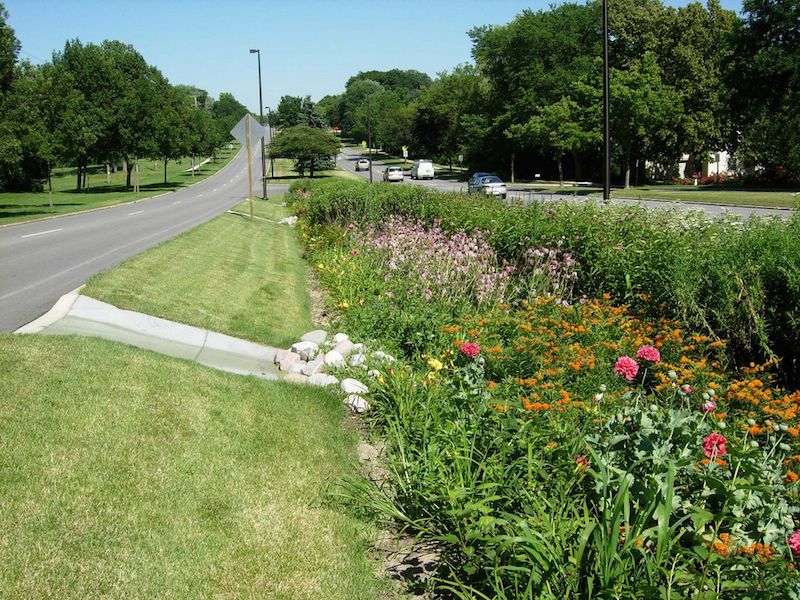Have you found stagnant puddles breeding bugs on the grounds of your business? Does your parking lot empty its stormwater runoff directly into a storm sewer that backs up and dumps oily water right back on your customers? Or maybe you bought a property for your new commercial establishment and want to start your water management system outright? You will find that you have many ways of dealing with stormwater runoff, but not all of them are right for your property. Bio-swales, however, just might be a good choice.
What Is A Bio-Swale?
A “swale” can have four meanings, but they all have to do with depressions in the ground that catch water. The type of swale we’re talking about here is a shallow ditch that is made to carry stormwater runoff and snowmelt away from places like parking lots. A bio-swale (sometimes called a vegetated swale) has sides that slope gently and plants, compost, and/or rocks filling it. It catches pollutants from the water and either neutralize them or holds them out of the sewage system. This protects the local watershed and mimics the natural filtering actions of the environment, which is why it is considered a low-impact development.
Benefits of a Bio-Swale
We are big fans of bio-swales. They improve the local water, give natural habitats to wildlife, and stabilize stream flows from runoff. You can also find them beneficial to your business.
1. They’re pretty. Whether you are running a hotel, a housing community, or a store, your customers will appreciate the vision of natural beauty on your grounds. It makes parks, resorts, and hotels welcoming and encourages shoppers to slow down and enjoy your goods.
2. Reduces money spent on infrastructure. If you run a park or similar enterprise, you will appreciate that bio-swales cost less than underground pipes. They reduce the cost of grading and clearing your land, and they cut down on the erosion that stormwater causes. We can make them out of existing drainage ditches, and they are easy to install from scratch.
3. They are incredibly easy to maintain. They need no fertilizer, only seasonal trimming, and very little watering. You should check the soil infiltration yearly, but the really important act as far as maintenance goes is monitoring the amount of debris and silt that the bio-swale is catching. We can clean it out for you, and you will find it easy to clean out yourself.
Designing Your Bio-Swale
When we put in bio-swales, we have quite a few things to consider in order to make it really fit with your property. The most important are:
1. Slope. The National Resource Conservation Department recommends a side slope no steeper than 3:1, or less than 5 percent. This keeps the water flowing at a reasonably slow rate that won’t uproot the filling in the swale and encourages the water to filter through the soil at more than one-half inch per hour.
2. Size. A bio-swales biggest contribution to cleaning runoff is its ability to deal with all the little rains throughout the year, but it needs to be able to deal with big storms, too. You have to make sure it is big enough to handle 4.3 inches in a day.
3. Filling. Generally, native plants are hardy enough to suck up pollutants such as fertilizer runoff, pathogens, and lead. Thick, heavy grasses are particularly good for filtering. This doesn’t dismiss the beauty and utility of gravel and compost fillers, mind. It’s just that deep-rooted native plants are the preferred way to go.
4. Shape and Placement. The swale will ultimately empty out somewhere. We want to make sure it starts in the right spot in the treatment train and ends somewhere far away from your buildings.
We would also need to take into account the soil type, groundwater table, and the dimensions of your property. Bio-swales don’t work well where the groundwater table is high since the soil won’t absorb the stormwater, and they really work best in areas that are less than 10 acres. If you have a really large property, we can put it in more than one.
Chapel Valley Landscape Company prides itself on its holistic approach to water management, and we would love to see if a bio-swale is right for your property. If you think your business could use one, let us know and we’ll come out to check for you.

